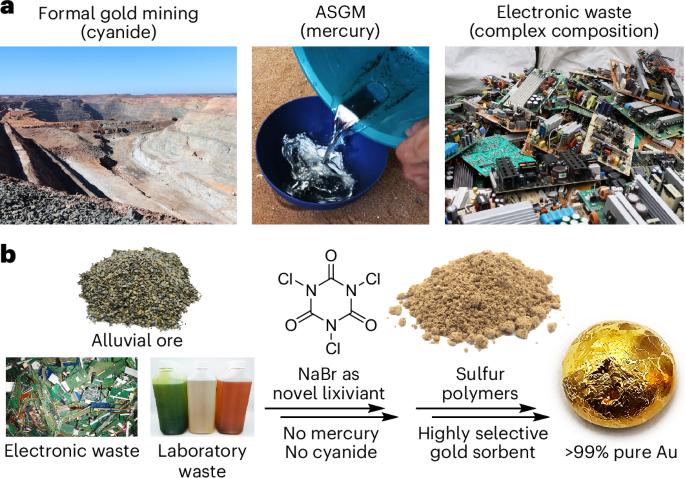Sustainable gold extraction from ore and electronic waste
IF 27.1
1区 环境科学与生态学
Q1 ENVIRONMENTAL SCIENCES
引用次数: 0
Abstract
Gold plays an essential role in the global economy and has wide applications in various industrial technologies. Currently, the gold supply relies heavily on mining processes that employ toxic substances such as cyanide salts and mercury metal, leading to substantial environmental pollution. Gold extraction approaches that do not rely on cyanide and mercury are needed to improve the overall sustainability of gold production. Here we develop an approach for gold leaching and recovery from ore and electronic waste. This approach first uses trichloroisocyanuric acid, activated by a halide catalyst, to oxidatively dissolve gold metal from ore and electronic waste, and then applies a polysulfide polymer sorbent to selectively bind gold from the leachate. The gold can be recovered in high purity by pyrolysing or depolymerizing the sorbent. The efficacy of this approach in gold extraction was validated using ore, electronic waste and other gold-containing waste. Overall, this work provides a viable approach to achieve greener gold production from both primary and secondary resources, improving the sustainability of the gold supply. Gold has a vital role in human society and the global economy, but its production currently causes high levels of environmental pollution. This work reports an approach that can effectively produce gold from both primary and secondary resources without the use of toxic substances such as mercury or cyanide.

可持续地从矿石和电子垃圾中提取黄金
黄金在全球经济中发挥着至关重要的作用,在各种工业技术中有着广泛的应用。目前,黄金供应严重依赖于使用氰化物盐和汞金属等有毒物质的采矿过程,导致严重的环境污染。为了提高黄金生产的整体可持续性,需要采用不依赖氰化物和汞的黄金提取方法。在此,我们开发了一种从矿石和电子废物中浸出和回收金的方法。该方法首先使用由卤化物催化剂激活的三氯异氰尿酸氧化溶解矿石和电子废物中的金金属,然后使用聚硫聚合物吸附剂选择性地结合渗滤液中的金。通过热解或解聚吸附剂可以回收高纯度的金。用矿石、电子废物和其他含金废物验证了该方法在提金中的有效性。总的来说,这项工作提供了一种可行的方法,可以从初级和次级资源中实现更绿色的黄金生产,提高黄金供应的可持续性。黄金在人类社会和全球经济中发挥着至关重要的作用,但其生产目前造成了严重的环境污染。这项工作报告了一种方法,可以有效地从初级和次级资源生产黄金,而不使用有毒物质,如汞或氰化物。
本文章由计算机程序翻译,如有差异,请以英文原文为准。
求助全文
约1分钟内获得全文
求助全文
来源期刊

Nature Sustainability
Energy-Renewable Energy, Sustainability and the Environment
CiteScore
41.90
自引率
1.10%
发文量
159
期刊介绍:
Nature Sustainability aims to facilitate cross-disciplinary dialogues and bring together research fields that contribute to understanding how we organize our lives in a finite world and the impacts of our actions.
Nature Sustainability will not only publish fundamental research but also significant investigations into policies and solutions for ensuring human well-being now and in the future.Its ultimate goal is to address the greatest challenges of our time.
 求助内容:
求助内容: 应助结果提醒方式:
应助结果提醒方式:


